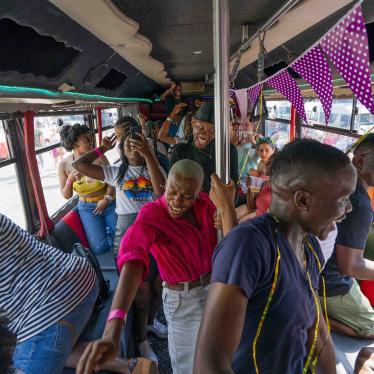(New York) - Angolan authorities should immediately quash the conviction of a Voice of America journalist who was convicted after an unfair trial for stories critical of a local judge, Human Rights Watch said today. Armando Chicoca was sentenced on March 3, 2011, to one year in prison for criminal defamation against a judge in the coastal city of Namibe.
Angola should also urgently amend its press law to decriminalize defamation, Human Rights Watch said.
"Jailing a journalist simply for doing his job undermines press freedom and makes a mockery of the legal process in Angola," said Daniel Bekele, Africa director at Human Rights Watch. "The Angolan authorities should rectify this miscarriage of justice quickly."
In 2010, the chief judge of the Namibe court, Judge President António Vissandule, lodged three criminal defamation lawsuits against Chicoca. He was found guilty in two of the cases. The first concerned reports aired on Voice of America and the private station Rádio 2000 regarding sexual harassment allegations maande by Vissandule's former domestic employee, who was also convicted of defamation in the same trial. The second case involved Chicoca's spoken comments on alleged corruption in Namibe's provincial court during a public event in Namibe with Angola's Ombudsman in 2010.
Chicoca's trial did not meet international fair trial standards, Human Rights Watch said. The trial was conducted by a subordinate judge of Vissundule's, undermining the impartiality of the proceedings. Chicoca was sentenced at a hearing without the presence of his defense lawyer, as required by both Angolan and international law. The defense also cited other trial irregularities and filed a complaint with the Supreme Court. After sentencing, Chicoca was immediately transferred to prison.
In a public statement issued in Washington, DC, the director of Voice of America said Chicoca's professional conduct as a journalist was beyond any doubt and that the journalist had given Vissandule "ample opportunity to respond to the charges," but that the judge declined to do so.
Defamation remains a criminal offense under Angola's press law, enacted in 2006. While international human rights law allows for restrictions on freedom of expression to protect the reputations of others, Human Rights Watch believes that criminal penalties are always disproportionate punishments for defamation and easily open to abuse, and should be abolished. Civil defamation is sufficient for the purpose of protecting people's reputations.
"Angola should be investigating allegations of official misconduct, not jailing journalists who report about such matters," Bekele said. "The government should amend the 2006 press law to decriminalize defamation, to prevent a recurrence of such blatant attacks on press freedom."
Background
Armando Chicoca is an Angolan journalist for Voice of America and the private weekly newspapers Folha 8, Agora, and Apostolado based in Namibe province, 1,000 kilometres south of Angola's capital city, Luanda. He has repeatedly been a target of official intimidation and harassment, anonymous death threats, and questionable prison convictions.
In December 2007, the Namibe court sentenced Chicoca to 30 days in prison for alleged "disobedience." He had been accused of crossing a police barrier to interview local people during a violent police clampdown against street traders who were protesting the demolition of a street market.
In December 2009, Chicoca was suspended by the Catholic church-owned Rádio Ecclésia, for which he worked at that time, after Vissandule complained to the station's director and to Namibe's Catholic bishop and criticized Chicoca's character. He remains suspended.
In January 2011, Chicoca informed Human Rights Watch that he had received anonymous phone text messages containing death threats against him and his family, referring to his writings "against the judge Vissandule." The journalist reported the threats to the police in Namibe, who announced an investigation. Human Rights Watch is not aware of the outcome of this investigation.







